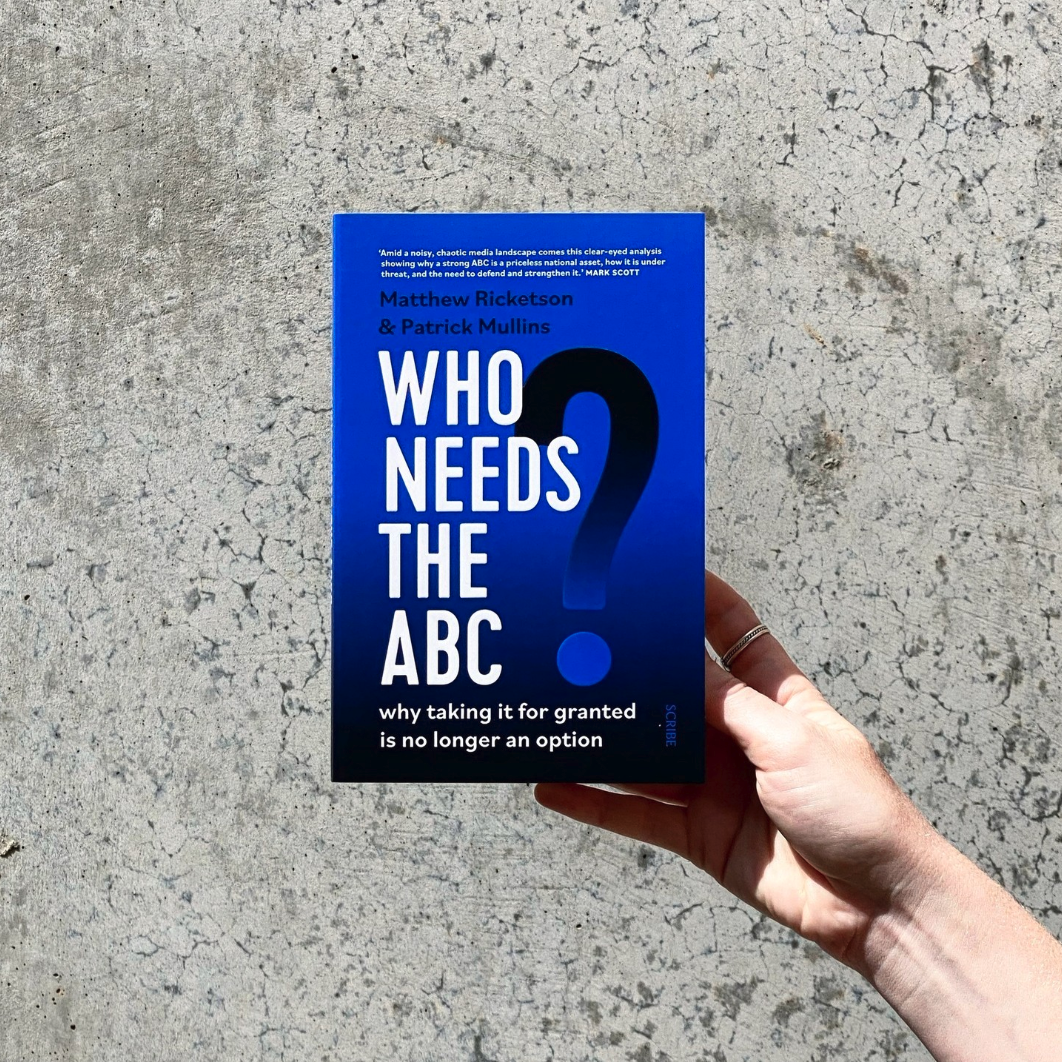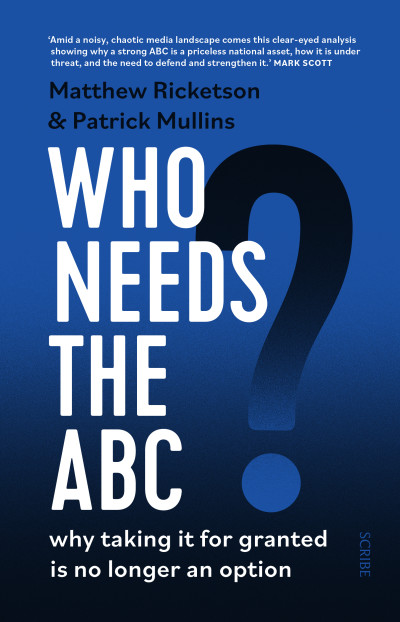Try imagining life without the Australian Broadcasting Corporation (ABC). There would be no 7.30 or Four Corners or Foreign Correspondent or Media Watch or Q&A on television. No local radio across every capital city and close to 50 regional centres broadcasting news and interviews and taking talkback. No Country Hour, no Landline. No Radio National offering specialist programs covering many areas (religion, law, philosophy, cinema, health, and more), from novel directions (Rear Vision), in different ways (All in the Mind), focused on people (Conversations), and with national living treasures (Phillip Adams has hosted Late Night Live for more than three decades now). No Triple J Hottest 100. No emergency broadcasting. No innovations like iview, which are now baked into everyday habits. No hidden pockets of the ABC’s giant website offering valuable resources for schools, such as ABC Splash.
What have we missed? Lots, actually. Homemade dramas like Mystery Road or Stateless or Rake. Comedies like Shaun Micallef’s Mad as Hell or Tom Gleeson’s Hard Quiz or Kitty Flanagan’s Fisk or Sarah Kendall’s Frayed. Favourites imported from overseas — Call the Midwife, QI, and Killing Eve. Favourites among the ‘massed five-year-olds’, as John Clarke called them — Bananas in Pyjamas, Play School, and Bluey.
We could go on — two classical-music stations, gardening shows dating back to the 1960s with Kevin Heinze’s Sow What, Boyer lectures annually since 1959 — but we won’t. This is a short book and time is shorter because there is a very real possibility a world without the ABC might exist by the time of its centenary on 1 July 2032. Not because it is failing to meet its legislated charter. Not because its business model has been blown out of the water by the internet. No, the ABC is reaching more Australians every day than at any time in its history, through its online platform and social media, and is doing so with substantially less money. In nominal terms, the ABC’s operational funding may have increased markedly since 1983–84, from $274 million to $881 million for 2021–22, but, adjusted for inflation, funding has actually dropped 4 per cent. So, too, staffing, from 6,800 in 1984 to 4,233 in 2021 — a 38 per cent fall. The threat to the ABC is real precisely — and paradoxically — because it reaches more people now. That the ABC’s footprint is large as well as deep has implications for the rest of the media industry and for an institution with which the ABC is inextricably entwined — its funder, the federal government. To paraphrase George Orwell’s Animal Farm, published in the decade after the ABC began in 1932, all governments loathe the ABC equally, but some loathe it more equally than others. The coalition government, in power since 2013, really loathes the ABC and gives every indication that if it could get rid of the ABC it would.
Understanding the far-reaching changes in recent years to both the news-media and political contexts in which the ABC operates, then, is a key to solving the ABC’s current predicament.
We’ll outline these changing contexts and their impacts, but first we need to clear some space for what you’re about to read. To write about the ABC today is a fraught exercise, such is the level of hostility swirling around the national broadcaster. When did you last hear a government minister say anything remotely positive about the ABC? The same question could be asked of the country’s national daily newspaper The Australian. Nothing like the same animus is directed at other cultural institutions, such as the National Library of Australia or the National Museum or the Australian War Memorial. Yes, the ABC is part of the news media, an inherently noisy, contentious industry, but the noise surrounding the news media has only increased in recent years, and around the ABC in particular it is almost deafening. The relentlessness and loudness of the ABC’s critics obscure from view the standing of the ABC as an important cultural institution. That seems to be part of the purpose: to carp and grind away at any and everything, large and small, real or not, to build a picture of the ABC as a hopelessly bloated, biased organisation that despite its name is somehow at root un-Australian.
Some sectors of the media, such as commercial radio and television or local and regional media, pretty much ignore the ABC as they have done in the past. Other sectors, like the Nine newspapers, have an eye on their own commercial interest but for the most part report the ABC straight, keeping in mind the need to cover a range of views on an issue. The problem is, that range of views now includes almost unremitting hostility from News Corp Australia, which publishes metropolitan daily newspapers in five states and a territory and one of the two national dailies in the country. The effect is to make scepticism bordering on suspicion a default setting for stories about the ABC.
Each week, though, more than two-thirds of all Australians watch ABC television or listen to ABC radio or read ABC Online. Since the beginning of 2020 — before the global pandemic — abc.net.au has been the most popular news website in Australia, ahead of news.com.au and nine.com.au, according to Nielsen Digital Content Ratings. The ABC delivers content on YouTube that reaches 22.6 million monthly unique viewers; on Facebook, which reaches 6.1 million monthly unique users; and on Instagram, which reaches 3.5 million users — the vast majority of them Australian, aged under 45, with a skew toward women. Podcasts produced from local ABC Radio content are downloaded 1.2 million times each month; from Triple J, they are downloaded 1.4 million times; from ABC News, it is 4.9 million times; and Radio National, which pioneered the popular new form in Australia, sees 7.8 million monthly unique downloads.
These are remarkable figures. Doubtless most of these people are uninterested in the culture wars, in which, as journalist Benjamin Wallace-Wells puts it, ‘every issue rings the same bell, and then everyone staggers bleary-eyed to their usual stations, like firemen at midnight’. The ABC finds itself dragooned into these internecine outbreaks of hostilities whether it wants to be or not. For the public engaging with ABC content every week, it is likely they love some content, hate other content, and shrug about the rest. To the extent they think about the ABC at all, they might nod in thanks to their taxes being well spent, but they might not dwell on this connection — so much is free to download these days, after all. Older viewers and listeners probably appreciate the ABC’s longevity in Australian life, quietly believing it should simply continue, like the National Library or the Museum or the War Memorial.
So, there is a gap in public discussion about the ABC.
Who can fill it? Who can provide an alternative, let alone supportive, perspective on the ABC?
The ABC can do this for itself, and sometimes it does, but campaigns spruiking yourself can look a tad unseemly, especially on a network that cherishes its ad-free status. Could the ABC Alumni provide this perspective? Perhaps yes. Set up in 2018, its members include former household names like Kerry O’Brien and Maxine McKew, who believe ‘a strong public service broadcaster is essential in a healthy democracy’ and advocate for it by giving speeches, making parliamentary submissions, and mentoring current ABC staff members. O’Brien also released a memoir in 2018 that provides detailed analysis of many of the important stories he worked on, as well as a robust defence of the ABC. A knowledgeable, committed group, then — but, by definition, one drawn from the ABC. And the Friends of the ABC? Nobody doubts their commitment, but they are, well, friends. In the current media environment, regrettably, they are rarely called on for comment.
That is why we have written this book. We don’t claim to speak for the millions of people who engage with ABC content. But we do hope to start a conversation among this audience. What we’re worried about is the attack, in plain view, on a valued cultural institution. We know it is valued because that’s what public opinion polls have been saying for decades. In recent years, however, there’s been a drop in the proportion of people surveyed who think the ABC’s news and current affairs is accurate and impartial. From a high point of 83 per cent in 2006 and 2009, the figure has dropped 10 percentage points to 73 per cent in 2021. The proportion of people who think the ABC offers a valuable service overall is still at 79 per cent, but it has dropped from 86 per cent in 2016. The highest rating is for ABC Online, at 92 per cent. Do these figures mean the critics are right, or do they mean the unceasing attacks on the ABC are eroding public confidence in it? Or something else? Whichever, we don’t think the ABC should suffer death by a thousand cuts, as one of its most respected alumni, Chris Masters, said he suffered, defending his landmark program about corruption in Queensland, ‘The Moonlight State’.
We come to this topic from different backgrounds. One of us (Matthew) has worked as a journalist at both The Age and The Australian, has studied the news media as an academic, and assisted Ray Finkelstein QC in an inquiry into the media (set up in 2011 by the Gillard Labor government), which in recommending stronger regulation earned him few friends in the media. The other (Patrick) is an independent scholar and author, of a biography of Australia’s least-loved prime minister, Billy McMahon, and an account of the censorship trials that engulfed the Australian publication of Philip Roth’s Portnoy’s Complaint. Neither of us has worked at the ABC, though like many we’ve been interviewed over the years on ABC programs.
We happily declare we believe in the value of the ABC as a national institution, which in the current environment means we probably will be dismissed as left-leaning, inner-city-dwelling, soy-latte-sipping self-abusers. Sigh. The ABC is far from a flawless institution. From our perspective as consumers, as well as in our professional assessment, a selected list of the ABC’s shortcomings is still lengthy enough. It is too often monochromatically mainstream in its outlook on the world. It boasts that it does not run advertisements … until it does, either in the form of endless cross-promotions for its own programs on its own network, or within programs themselves. It is Sydney-centric. It can be timid in the face of pressure from governments: the ‘pre-emptive buckle’, a term invented by the ABC’s Michael Cosby nearly half a century ago, is still more common than it should be. Like all large media organisations, the ABC is prey to office politics, but they take on a peculiarly dispiriting form at the national broadcaster that has curdled the creativity of many a program-maker. The ABC may no longer be part of the conventional public service, but it remains bound, some would say hidebound, by the strictures of bureaucracy. As Ken Myer said soon after becoming chair of the ABC in 1983, when the commander of an aircraft carrier orders ‘Hard a-starboard’, the ship ploughs on for another four kilometres before turning; while a member of his board, Robert Raymond, described the corridors of ABC headquarters being ‘enfiladed by management intrigues’ and ‘union ambushes’. The flip side of the ABC being the most accountable media organisation in the country is that its program-makers and executives spend an inordinate amount of their working day responding to complaints, whether from the public, from parliamentarians in Senate estimates, or from rival media outlets making use of the freedom-of-information laws to probe for stories.
We could go on, but as we’ve already said, time is short. Whatever faults the ABC has are far outweighed by its strengths, and, equally to the point, the ABC faces a more hostile government than at any time in its near 90-year history. As this book went to press, it was unclear when the next federal election would be held. Regardless of who wins, there is a lot that needs to be done to repair problems in the ABC’s funding process and governance, as we will outline in later chapters. A barrage of funding cuts, internal turmoil, and a chorus of harping critics within government and outside of it have made the ABC’s future a live issue. ‘Many of my colleagues in the government see the ABC as the enemy and think it should be treated as such,’ Nationals MP Darren Chester told us. ‘A number of the more ideologically aligned MPs think we’d be better off if we didn’t have the ABC anymore.’ Chester does not think the government would actually follow through on this threatened action: ‘There’s still National Party MPs and some of the sensible metro MPs who strongly support the ABC.’ Perhaps. Nevertheless, talk of the ‘enemy’ by coalition members is telling. It suggests a fundamental hostility that may end in the kind of world we’ve just imagined — a world without the ABC. Is our imagination running away with us? We don’t think so. In any case, forewarned is forearmed.
Keep reading.




